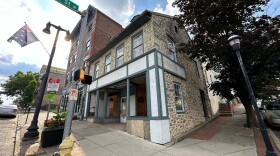-
Bethlehem Planning Commission said it wasn't comfortable giving the green light, as the property owner, Nicholas Bozakis, and his team submitted elevations and architectural details from a different, yet mostly similar, project from across town.
-
The project would consist of a Lehigh Valley Health Network medical facility and 190 residential units near Lehigh Street and MacArthur Road.
-
Easton's Planning Commission recommended the Zoning Hearing Board approve a subdivision of the Hooper House and Timothy House lot at their Wednesday meeting.
-
The city Zoning Hearing Board recently approved dimensional variances to allow developer Abe Atiyeh’s plans for a new 5-unit townhome project in West Bethlehem.
-
Locally, housing costs still remain lower than national averages, but data from real estate marketplaces compared with U.S. Census data in Lehigh and Northampton counties show housing affordability still is a struggle.
-
In 2025, LehighValleyNews.com readers gravitated toward stories that reflected mounting economic pressure, public safety concerns, environmental uncertainty and moments of sharp civic tension.
-
The rebate is meant to help seniors, widows and widowers and residents with disabilities who paid property taxes or rent in 2024.
-
Easton was honored in the AARP's 2026 10 Great — and Affordable — Places for Older People to Live list, making it the only place in Pennsylvania to be included in the roundup.
-
Applicant Nicholas Youssef envisions an all-new three-story building at 330 East Fourth St., featuring four two-bedroom apartments in the upper floors and about 1,800 square feet of ground-level commercial space.
-
Developers behind a 34-unit apartment intended for Easton's North 4th Street tried to challenge an ordinance restricting building heights and sizes at the city's Thursday Zoning Hearing Board meeting.
Play Live Radio
Next Up:
0:00
0:00
Available On Air Stations










